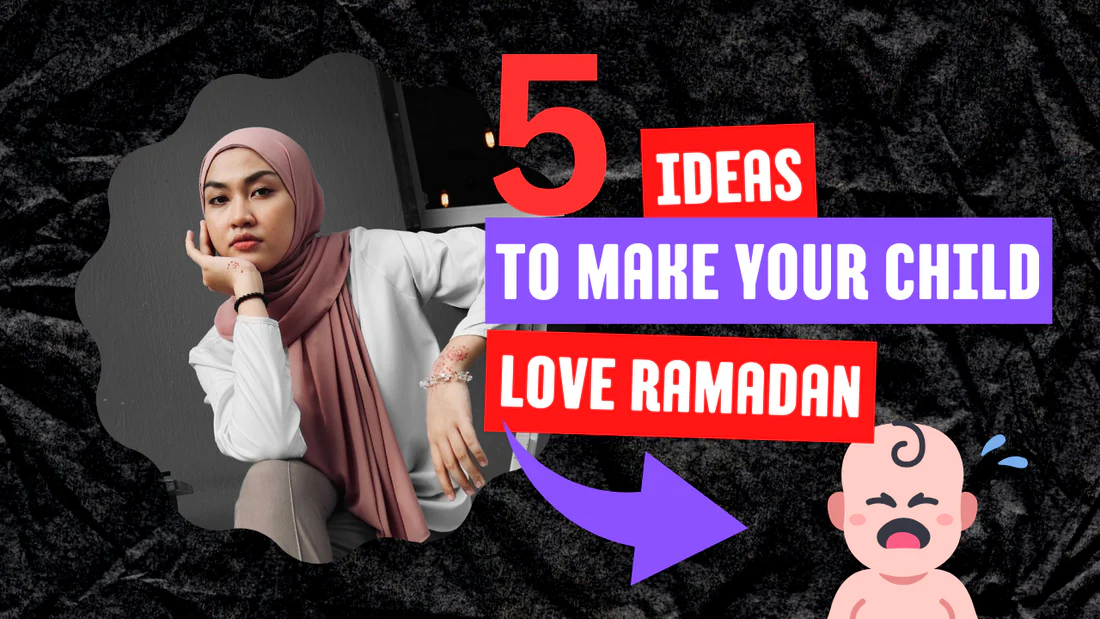The month of Ramadan is the month of fasting, mercy, patience, we take advantage of it to read the Koran more diligently and multiply the supererogatory prayers.
Introduction
Without a doubt, this blessed month represents for us a month where our faith is strengthened and where we hope from Allah for the erasure of our sins and the purification of our actions.
So, every year, we look forward to this month and make the most of it to reap the many benefits it contains.
But this is not necessarily the case for everyone in the household…
Indeed, in the midst of the excitement caused by the arrival of the month of Ramadan, we do not always think of our children who, for their part, do not really understand what is happening…
Of course, we explain to them what fasting is and what it consists of, but we do not redouble our efforts so that they love the month of Ramadan with true and sincere love, and wait for it every year with impatience and that they become actors of this blessed period.
Here are 5 effective and caring ideas to make our children love Ramadan, let’s go!
1- Include your child in the tasks falling to the month of Ramadan
So that our children get involved during this month of Ramadan and do not feel left out, it is entirely possible to assign them some daily tasks related to this blessed month: prepare a simple dish for them. Iftar, clearing the table after breaking the fast, waking up his brothers and sisters for Souhour… By assigning missions and entrusting responsibilities, even small ones, to your child, he will naturally integrate into the atmosphere of Ramadan and will understand that, like any other Muslim, he has a role to play.
2- Take the time to explain to your child the benefits of this blessed month
The month of Ramadan is an opportunity to immerse yourself in books and review with your child the many benefits that this blessed month contains. There are several methods to explain Islam to your child and teach them the important values of their religion.
One of them is the method of rhetorical interrogation.
This is a way to capture the child’s attention and pique their curiosity by asking them certain types of questions.
Moreover, the Prophet used to ask these kinds of rhetorical questions to his Companions in order to arouse their interest on religious questions.
Let us take the example of the following hadith, reported by Al-Bukhari and Muslim:
Abu Hurayrah said: The Prophet said: “What would you say if a river flowed past the door of one of you and in which he washed five times a day? Do you think any dirt would remain? on his body?
The Companions then replied:
— No, no dirt would remain. »
The Prophet continued:
— It is the same for the five prayers by which Allah erases sins. »
This method of asking a question arousing curiosity and arousing the child’s interest is an interesting and effective way to convey to them the benefits of the month of Ramadan and make them love this month.
3- Encourage your child to fast
Among the solutions to make your child love the month of Ramadan is to gradually encourage them to fast. By doing so, you will make him feel that he is great and that it is time for him to start working in the hope of obtaining the satisfaction of Allah ‘aza wa jall.
In her work “I educate my child”, Umm Abd Ar-Rahman Al-Athariya explains:
“We must accustom (the child) to fasting in stages, such as, for example, ordering him to fast a quarter of a day, then a half, then a whole day. »
4- Become a model for him
To educate a child, encourage him towards good and steer him away from evil, there are of course various advice and recommendations. But there is another, much more effective possibility: education by example. A way of educating that can be implemented on various occasions, particularly during fasting.
This simply involves becoming a role model for your child.
In her work “I educate my child”, Umm Abd Ar-Rahman Al-Athariya explains:
“Children’s level of understanding is much lower than that of adults. This is why seeing with your own eyes how a person behaves in a given situation is one of the most important means of education, even more than reading a book, attending a class or applying any other educational method. »
The author adds:
“The child, or adolescent, who witnesses an attitude or a virtuous act for which the author deserves praise, is therefore influenced deep within. He will then approve of this behavior, appreciate it and give it his full esteem, which will push him to imitate the author. »
During this month of Ramadan, let us try to be good examples in front of our children, in particular by multiplying prayers by reading the Koran frequently but also by perfecting our behavior, far from any lies, insults and other comments harmful to the heart.
5- Talk about Eid, a holiday for Muslims
Obviously, the Eid Al Fitr festival is an event that your child must not miss so that this month of Ramadan enters their heart. This festive day is an opportunity to get together as a family, to wear beautiful clothes, to beautify oneself, to organize an outing with friends, to eat cakes and perhaps sweets.
Many of us have wonderful and nostalgic memories from our childhood regarding this day of celebration and joy. It is therefore appropriate for parents to involve their children in the worship of this day so that it is engraved in their minds and in their hearts.
On this subject, Imam Nawawi said:
“There is a consensus that the ghusl for both ‘id is a sunnah for every person, whether for men, women or children because what is intended by this ghusl is beautification and Embellishment is requested from everyone. »
(Al Majmou’ Charh Al Mouhadhab vol 2 p 233)
Let’s end with a most beneficial quote from Ibn Al-Qayyim:
“Anyone who neglects to teach his child what is beneficial to him, and lets him grow up without any purpose, will have sinned against him in the most serious way. Indeed, it is because of parents and their negligence that many children turn out badly, because they were not taught the obligations of religion and its meritorious acts. »
(Source: I educate my child, Umm Abd Ar-Rahman Al-Athariya)


